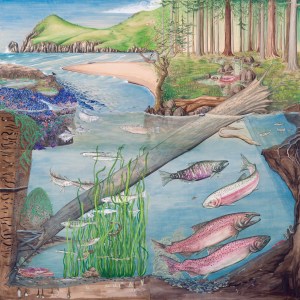“Looking Upstream” scholarship winners
Conservation Northwest / Jul 09, 2019 / Central Cascades
Scholarship applicants submitted compelling and thoughtful entries that captured the intrinsic and ecological importance of healthy forest management and watershed function in Central Puget Sound.
by laurel baum, central cascades conservation associate
In early spring, we launched a new scholarship through our Central Cascades Watersheds Restoration program, which works to restore habitat on the public lands north and south of I-90 that are vital to wildlife movement between Mount Rainier National Park and the Alpine Lakes Wilderness.
 We asked college students in communities of the Green-Duwamish and Puyallup-White river watersheds to answer the following question: Why does the health and management of the upland forests and whole watershed function, from the snow-capped mountains to the Puget Sound, matter to you and your community?
We asked college students in communities of the Green-Duwamish and Puyallup-White river watersheds to answer the following question: Why does the health and management of the upland forests and whole watershed function, from the snow-capped mountains to the Puget Sound, matter to you and your community?
Our panel of judges included representatives from Conservation Northwest, Green-Duwamish and Central Puget Sound Watershed – WRIA 9, Mount Baker-Snoqualmie National Forest, Puyallup Tribal Fish & Wildlife Program, the Emerald Alliance, American Rivers and South Puget Sound Salmon Enhancement Group.
We received strong entries that described the role watersheds and forests play in their communities. We’re excited to announce the winner, who will be awarded a $3,000 scholarship toward their continued education, Chris Meder, a student at the University of Washington, Department of Civil & Environmental Engineering.
“The braiding of mountains, rivers and forests is the natural soul of western Washington,” Meder wrote. “Our rivers and streams provide wonderful places to fish for salmon and steelhead, paddle rapids and float calm reaches, dip feet and swim in cold pools, and watch wildlife. Our forests host families camping, space for nights spent under the starts, offer up shady-cool forest hikes in the heat of summer, and a place to hunt and be among nature.”

“Healthy, well-managed watersheds along with thriving wetlands act to reduce flooding, moderate river flows, decompose contaminants and waste, and cycle nutrients back into the landscape,” Meder wrote. “We derive the benefits of these functions essentially for free when we prioritize managing the health of our watersheds.”
We’d also like to congratulate the two runners-up, who will each be awarded a $500 scholarship, Graham Klag: a master’s student at Evergreen State College, where he aims to combine art and science to reach a broad audience through the Environmental Studies program, and Keshreeyaji R. Oswal, a student at the University of Puget Sound.
Thank you to all who submitted entries about your community’s connection to the Green-Duwamish and Puyallup-White river watersheds. If you were unable to apply for this scholarship this year, please keep an eye out, as we hope to continue this opportunity in the future!

